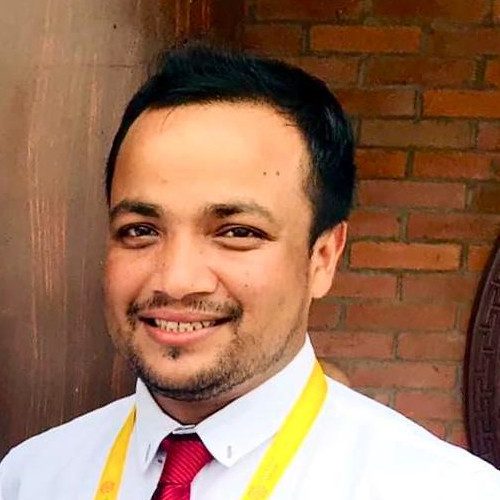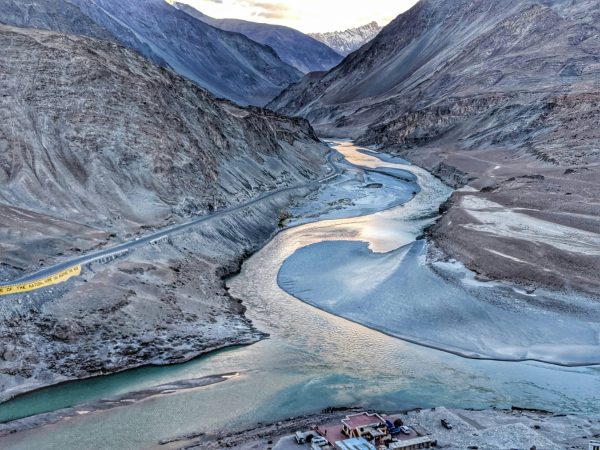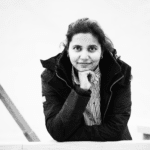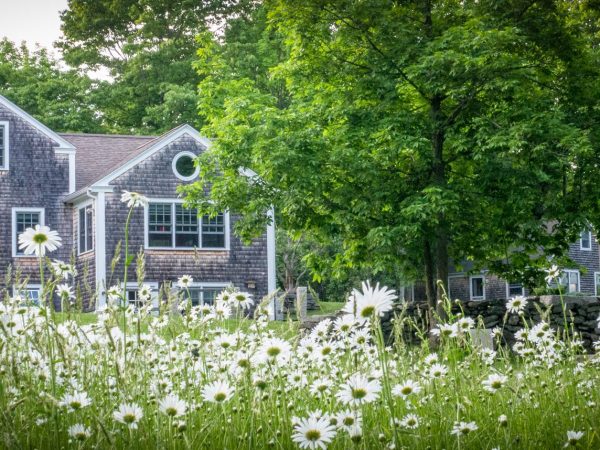The Buddha once told his disciple Ananda that spiritual friendship—sangha—is the whole of the spiritual life. As we celebrate Māgha Pūjā (Sangha Day) on February 27, we express our appreciation for the entire Earth community, and we highlight one particular sangha that models transformative care for their wider community and the land surrounding them.
Monastics in general live lives of intentional simplicity. But the monks of Cambodia’s Serei Sakor Daun Sdoeung Pagoda go further, growing food for themselves and the lay community using practices that preserve the health of the land. In addition to the material impact of their work, they serve as a powerful example of how our communities—Buddhist and otherwise—can grow in friendship with the Earth.
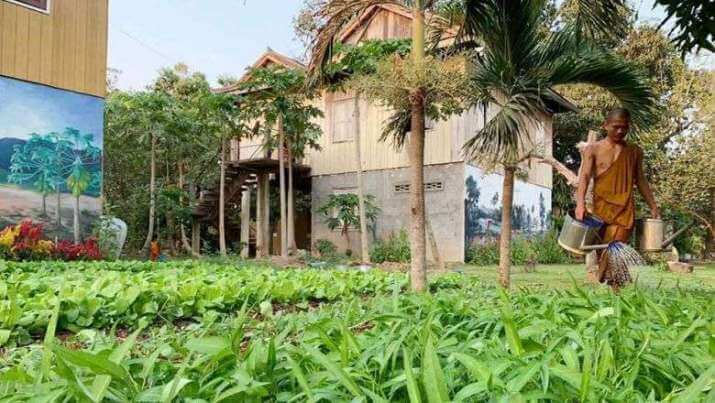
As the need for more sustainable lifestyles grows increasing apparent, many Buddhist monks in Cambodia have redesigned their temples with garden spaces to enable the resident monastics to grow their own food.
Serei Sakor Daun Sdoeung Pagoda, located in Senareach Udom commune’s Snay Proem Village in Preah Sdach District, has designated a green space in which the resident monks grow a variety of rice, fruits, and vegetables, including lettuce, morning glory, spinach, Chinese kale, eggplants, tomatoes, corn, lemongrass, pumpkins, fragrant coconuts, water lilies, bananas, jackfruit, mangos, rose-apples, and papayas.
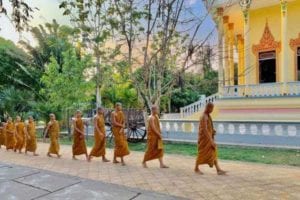
Initiated by the pagoda’s chief monk, Ven. Im Teang, some 10 years ago, the monks have since planted more than 3,000 trees on the surrounding land, as well as following other eco-friendly routines, such as strictly avoiding using plastic bags.
“I value spiritual and physical well-being and I believe that growing fruits and vegetables can contribute to both aspects of life. Growing organic vegetables helps monks and nearby villagers to be active through physical exercise as they sweat while working the land,” said Ven. Teang. “The pagoda doesn’t have to spend money to buy vegetable and risk consuming unhealthy foods.” (The Phnom Penh Post)
“We value our [own] life and we should not hurt others. Even trees are living things and we should not harm trees or nature because they’re living things just like us. I love trees and plants,” Ven. Teang explained. “If we have to fell one tree, we should replant two. Trees provide a green canopy to the Earth and other living things. They protect the Earth from global warming.” (The Phnom Penh Post).
‘We have more vegetables and fruits than we need for our daily consumption. Our priority is to reserve them for nearby villagers.’
Concerned about sustainability for health, the economy, and the environment, the monks use only natural fertilizers in their agriculture.
“I think that growing organic vegetables is not difficult. The technique goes back to the early days of our ancestors,” said Ven. Teang. “Growing and eating what you plant is good for [one’s] health. When you’re healthy, you can study and work effectively. It is not for no reason that people say ‘you are what you eat.’” (The Phnom Penh Post)
Serei Sakor Daun Sdoeung Pagoda helps the local villagers to grow organic food, sharing rice seedlings with them when the rainy season starts. It also offers its stocks of rice and vegetables to needy people.
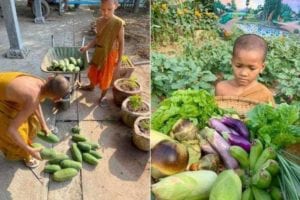
“We have more vegetables and fruits than we need for our daily consumption. Our priority is to reserve them for nearby villagers. People who come from far away can also get food from the pagoda if we still have it in stock,” said Ven. Teang. (The Phnom Penh Post)
Built in 1874, Serei Sakor Daun Sdoeung Pagoda was almost destroyed during the Khmer Rouge period (1975–79). After the fall of the brutal regime, the monks and villagers began working together to rebuild the site. Now the pagoda is one of the most esteemed Buddhist centers out of 500 pagodas in Prey Veng Province, and is renowned as the greenest Buddhist temple in Cambodia.
According to The Phnom Penh Post, as of 2018 Cambodia had 4,932 pagodas, including 563 ancient temples. There are 68,654 monks mostly practicing Theravada Buddhism, who rely on donations and alms collected each day for their sustenance because the monks dedicate their lives to spiritual development. However, people praise Serei Sakor Daun Sdoeung Pagoda’s agricultural practice as a good example of self-reliant and sustainable living.
“What a great inspiration for all…sustainable green living. I must visit when I visit Cambodia,” commented Srey Thon, a follower of The Phnom Penh Post’s Facebook page.
This article was originally published on Buddhistdoor. It is reprinted here with permission.
Dipen Barua is an honorary lecturer at the Centre of Buddhist Studies, The University of Hong Kong (HKU). He obtained his Bachelor’s degree from Calcutta University and his first Master’s degree in Pali from University of Pune (now Savitribai Phule Pune University), India. He received a second Master, an MPhil and his doctorate in Buddhist Studies from HKU. He is also a prolific writer on Buddhism and society and a regular contributor to Buddhistdoor Global. His academic interest is Pāli textual studies, early Buddhist Philosophy and Theravāda Buddhism’s perspective on the consciousness, mind, and cognitive functions.
